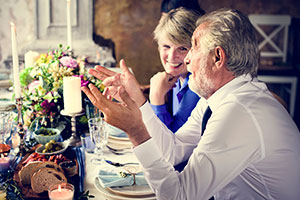It’s your wedding day. Some would say it’s up there in being one of the biggest and happiest days of your life. But, for wedding guests who are living with dementia it’s not that simple. We asked Mark Quarmby, Head of Dementia at Reconnect, to share his top tips for helping someone with dementia to build new memories and enjoy the big day…
Dementia expert: give wedding guests the choice
Memory loss, cognitive difficulties, confusion. These symptoms often affect a person with dementia’s behaviour, confidence, relationships and social roles.
As a result, many feel inclined to withdraw from larger gatherings and occasions such as weddings. And for those that choose to go, feelings of confusion or difficulties in communicating can affect their mood and worse still, cause them to feel distressed. This can be difficult for the person with the condition, and for those around them.
If someone that has dementia chooses to attend your wedding, there are a number of things you can do to support them and their enjoyment of your special day. 
Be supportive, and sensitive
There are a number of transitions at a wedding, with photos being taken or guests gathering for reception drinks, creating openings for the person with dementia to feel lost and out of sorts. To help with this situation, consider enlisting the support of a close friend or relative to chaperon them throughout the day.
Chaperons need to be mindful of the tone, pitch and speed of their voice and to remain relaxed. Keeping their voice friendly, avoiding high pitches or a loud volume and keeping the conversations casual in context is advised.
Create some quiet
Weddings are often lively, noisy and for the person with dementia, overstimulating. A designated quiet room – not too far away from the celebrations – would give them the opportunity to retreat for a while if they become overwhelmed. Other wedding guests, without the condition, may also benefit from this type of facility.
Use prompts effectively
Struggling to keep up with conversations or remembering the names and faces of those around them can cause a significant amount of anxiety. Giving them a table seating chart and labelling items can help to relieve this. Photos of family and friends can also help to prompt memories and trigger positive responses.
Their chaperon can function as a physical prompt, being aware of the need to pronounce their words clearly and simply, as someone who can help to prompt their memory and step in to bridge any difficulties in conversation.
Seating is key
Reserve seating at both the ceremony and during the reception that will allow wedding guests with dementia to see and hear well – and ensure it provides an easy exit route for retreating to the designated quiet area or for a comfort break. Exit signage placed at the person’s line of sight is also helpful.
Sing a song
While they may struggle to communicate and have memory problems, many remember songs from their youth or past years as music and melodies are stored in a different part of the brain’s memory centre to words. Adding some of their old favourites to your playlist and involving their chaperon in encouraging them to sing along will help them feel connected and a part of the festivities.
Knowing how wedding guests with dementia might be feeling, and following these tips, will allow you to enjoy your day safe in the knowledge that they are enjoying it too.
Reconnect is a ground-breaking new approach to dementia care. Developed by clinicians at Orchard Care Homes, with a combined experience spanning over 60 years, this pioneering plan is being implemented in specially adapted nursing homes UK wide.


Add new comment